Thinking about where to go in between the period of June-July? Well, the places to go are multiple. Let’s say it depends on what kind of activity you want to plan for this specific timing. If the first thing that comes to mind is going to the beach… then Bali is just for you. Surely, it’s for those types who want to take a rest in the beach during the morning and enjoy the rest of the day wandering around the island and discovering lots of interesting things.
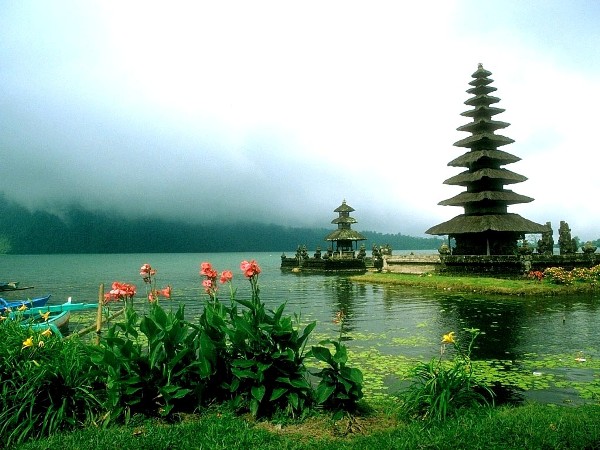
Bali -island of thousand temples- is one of the smallest islands of the Malay Archipelago. It lies between the Pacific and Indian oceans, between the peninsula of Malaysia and the island of New Guinea. The islands of Java and Bali are separated by a narrow strait from eastern neighbor – the Strait of Lombok (Wallace’s line) width of 30 km.
Mountain Lake (the largest Batur and Bro are of volcanic origin) is fed by rivers flowing from the central and southern parts of the island, and countless irrigate rice fields. On the island of Bali there are 2 main volcanoes – Agung (3142 m) and Batur (1717 m). They ensure the fertility of the island (disgorged their ash has high content of minerals). Active volcanoes in Bali are considered to be a constant threat, although the last eruption was more than 30 years ago. The capital of Bali is Denpasar. The time is not being shifted here, so you better be careful when counting out the time to call back home.
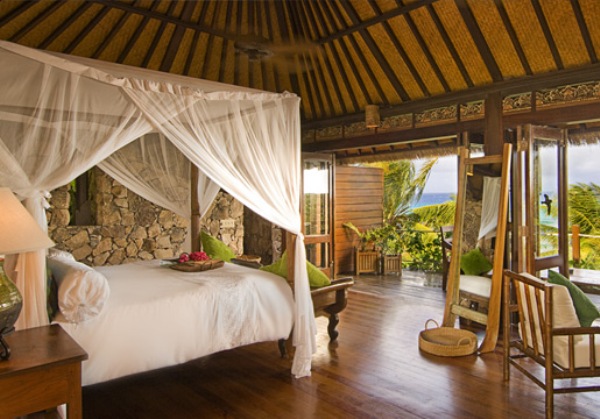
Diversity of the landscapes of this little island is amazing. It even feels like there’s something mysterious in it. The lush tropical vegetation, rice fields, terraces, palm groves – in the south and next to it there are mountain lakes and rivers, and nearby, on the Bukit Badung peninsula, – the eternal drought. The north of the island can be characterized by black lava beaches. As to the west there are impenetrable forests, to the east – a stern and barren landscape.
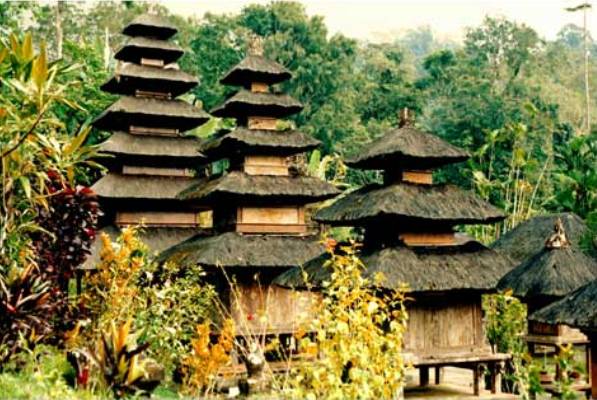
Water recreation lovers just need to visit the southern part of Bali and visit Kuta, Legyan, Seminyak, Dzhinbaran, Sanur, Nusa Dua. Among the lovers of art the most popular place is Ubud. The most famous temples are Pura Taman Ayun, Pura Tanah Lot, Pura Lahuri Batukayev, Pura Tirtha Empul, Pura Besakih and Goa lavas. For the lovers of rock music it is worth to visit Hard Rock Hotel Bali – the first sea-rock resort in the world. Holidays in Bali will be remembered to you for a long time.
In Bali there are 2 periods – during the rainy season and drought period. This is caused by monsoon winds. From November to March, north-west monsoon brings rain, and humidity rises sometimes up to 95%. Location near the equator provides a single temperature of 30C all year round, and in the mountains is colder than – 10C and below. In Bali there is no way that the rain poured down all day or several days in a row.
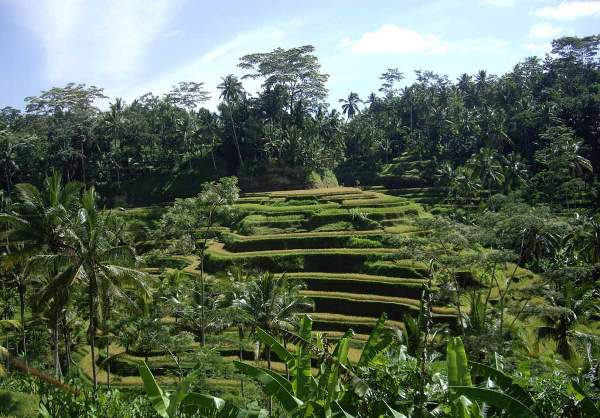
Since the invasion Javanese Bali established caste system. At the top of the hierarchy – Brahmins (priests), then Sutro (highest known) and vesya (warriors). These three castes is 3% of Balinese Hindus, organized under the title trivangsa, the rest are called Sudras or Jaba (commoners). On the island of Bali lives a small population of Chinese. In some villages Bali Aga (original inhabitants of the island) live separately, trying to maintain their foundations.
Official language of the island is Indonesian. Native language of the inhabitants – Bali, and is divided into two dialects – upper-bali and down-bali.
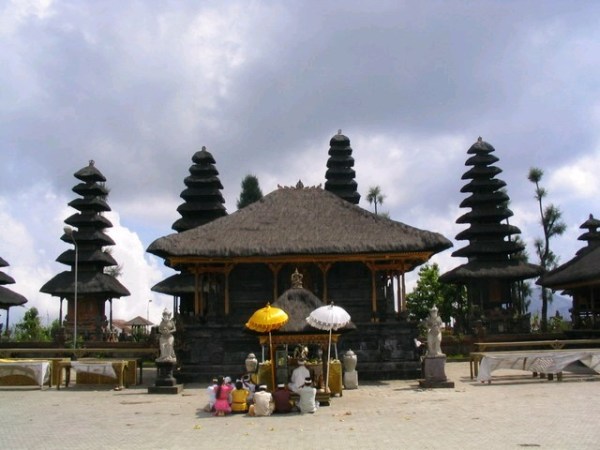
Bali can be called out to be the safeguard of Hinduism. The local Hindu community is the largest community which situates outside India. But the local religion is far from its roots and an Indian who came to Bali, will find the savage, rather than co-religionists. Religion indudharma finally formed in the tenth century, when the Princess of Java married the King of Bali, under the influence of animism (belief in the spirituality of nature) and the traditional worship of ancestors. The adherents of this religion consider themselves to be 94% of the Balinese people.
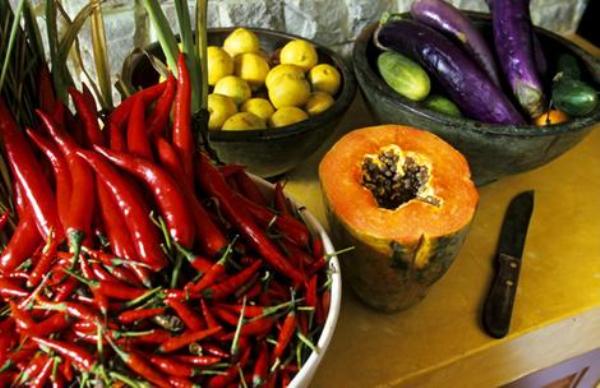
To explore the culinary culture of the island of Bali have to go to varong- tables of the bar, where the cabinet is set with specific dishes and curtains made of bamboo, limiting the space. Meals are served on plates with appliances (sticks are being used only by local Chinese). The dishes vary from the simplest one up to the extravagant and delicious, but prices are relatively low for both of the versions. The thing is that the food is mostly made of the local ingredients here, which are considered to have relatively low prices.
Rumah poppy – varong with actual walls is the indispensable component of the Balinese and Indonesian culture. Traditional dishes of Balinese cuisine are rather difficult to prepare, so you can enjoy them only on specific holidays, but the dishes are typical of the other islands are served in almost every restaurant: chicken soup (soto ayam), steamed vegetables with peanut sauce (gado-gado).Some popular dishes here are related to the Chinese cuisine, but those are less acute: various vegetable mixes, fried noodles.
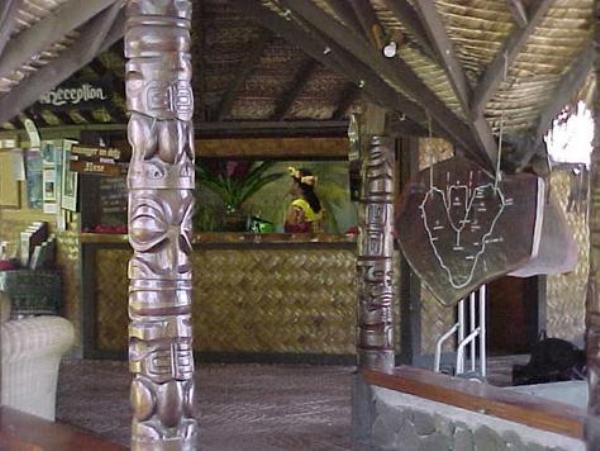
In contrast to the Muslim areas of Indonesia in Bali they eat pork, and suckling pig – a festive meal, like a duck, cooked in banana leaves. The last dish is something worth of trying for sure. And the best is that June-July period is when all of this is being served quite often.
It’s kind of hard to imagine but the alcohol drinks are something rare here. The locals usually serve the food with some water or hot tea. What’s the reason for that? Who knows? Most likely the locals enjoy the very sober way of life or maybe that’s because of the Muslim population surrounding the place. On the island of Bali there are only few little vineyards which make wine exclusively for tourists. Worth a try rice wine or rice and palm vodka, though those can not be found in all of the places and are typical only for the “tourist” type of bars.
For dessert, you can always select something fresh and local. There’s a wide range of tropical fruits: Salak, rambutan, durian and much more, which have heavenly wonderful smell and taste fantastic.


May 2011
Thanks a lot for wonderful Bali ! The info is very useful and interesting. Can’t wait to visit Bali from the 8th July to 20th July. Hoping the two dormant volcanoes will remain “sleeping”!
See you!
Best regards from Chusri ( Denmark)